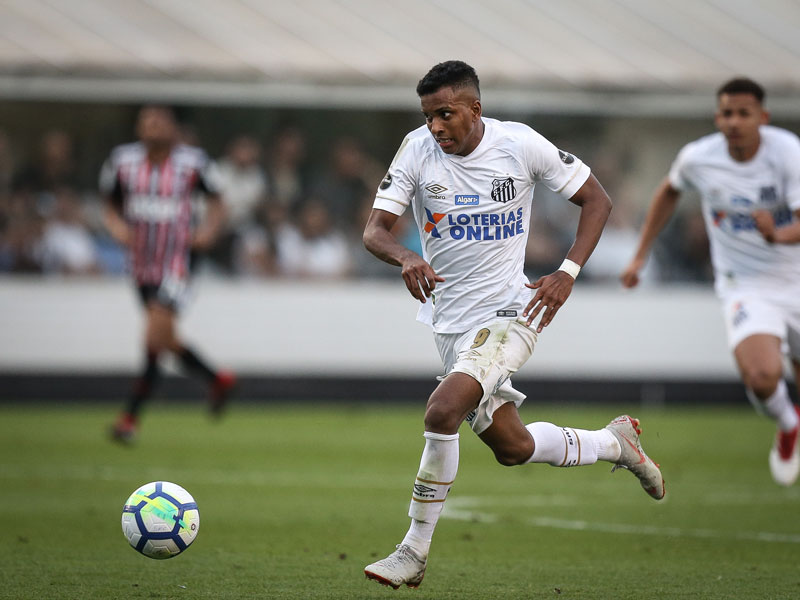Tim Vickery’s Notes From South America: Jorge Sampoali Thrown In At Deep-End
The Brazilian season is less than a week old– the State Championships kick off at the weekend. And so, with very little preparation time, Jorge Sampaoli is being thrown in at the deep end as coach of Santos.
The Argentine produced outstanding work with Universidad de Chile, the Chilean national team and with Sevilla – only for things to go disastrously wrong with Argentina. Taking charge of Santos is a bold way to go about restoring his reputation – and the early signs are worrying.
Santos have lost striker Gabriel ‘Gabi-goal’ Barbosa, the top scorer of last year’s Brazilian Championship. Owned by Inter Milan, he has now been loaned to Rio giants Flamengo. The immensely promising Rodrygo is with Brazil’s Under-20 squad, and is just a few months away from joining Real Madrid. The squad looks thin. There is one recognised outstanding performer, goalkeeper Vanderlei – but Sampaoli is not keen. His style of play requires a keeper who is good with his feat, and this is one of Vanderlei’s weak points. Efforts to bring in the Uruguayan international Martin Campana from Independiente have so far proved fruitless, leaving Santos without Campana and with an upset Vanderlei.
Sampaoli, too, is already dissatisfied, making the point that a great name like Santos need to be represented by a great squad. Further attempts will be made to bring in some new faces. But they run into the question of the club’s limited financial resources – which in turn points to a wider question for the future of Brazilian football.
The country talks of a traditional ‘big 12’ – the four traditional clubs from both Rio and Sao Paulo, the major centres, and two each from Belo Horizonte and Porto Alegre. The recent rise of Athletico Paranaense, from Curitiba, has led some to float the idea of a ‘big 13’ – and that is without mentioning the largest teams from cities such as Salvador, Recife and Fortaleza – clubs with significant fan bases, but historically more regional players than national ones.
That old guard of 12 are undeniably important clubs, all of them able to point to histories filled with world class players and rich in achievement. But the question is this; in the contemporary world, can all of them retain their status of giants?
The story of club football in Brazil is essentially regional – inevitable given the size of the giant country. It has been all about the quest to be top dog in your own city. The existence of the State Championships – one for each of the country’s 27 states – is a crucial component in the flowering of so many big clubs. Being a big club, especially in Brazil, means winning titles. The State Championships gave many teams the chance to be champions, and thus consolidate big club status.
Nowadays, though, the State Championships are no longer considered important. Winning the title is still celebrated – but the allure quickly fades when the real stuff starts. Athetico Paranaense, for example, no longer even bother to field their first team in the Parana state competition. The measure of quality is the national championship, the national cup, and the Copa Libertadores, South America’s Champions League. There are fewer worthwhile titles to go round, fewer chances for a meaningful lap of honour, fewer opportunities for clubs to parade their status as giants.
And there is another question. Financial gaps are opening up between the traditional giants. This is especially important because the calendar is so packed with matches that it is all but impossible to fight on all fronts with a small squad.
Reigning national champions are Palmeiras. With wealthy sponsors and an impressive and lucrative new stadium, they have been able to assemble a squad of both strength and depth. The secret of their 2018 success was clear. Coach Luiz Felipe Scolari effectively divided his players into two groups – one for cup games and one for the league.
This worked so well that the similarly wealthy Flamengo have followed suit. Their new coach, Abel Braga, is, like Scolari, a veteran who excels in the role of father figure. And the club are busy in the transfer market, trying to accumulate two quality players for every position.
Their Rio rivals are struggling; Fluminense, the daddy of them all, are in a terrible financial mess – as are the once proud Vasco da Gama. Botafogo, who supplied so many players to World Cup squads, are on more solid ground but these days have little hope of winning the league. And back at the mighty Santos, the club graced by Pele and so many legends of the game, Jorge Sampaoli must be looking on with envy. While Palmeiras and Flamengo aim to be able to field two good sides, he is finding it hard to build one.
Don’t forget to follow World Soccer on Facebook and Twitter.






